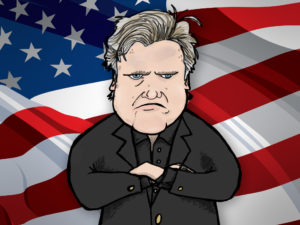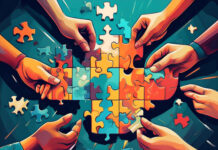
In The American Spectator Ralph Benko explains the comparison of Steve Bannon to Charles De Gaulle made by New Yorker writer Adam Gopnik. Benko calls Gopnik a “card-carrying member of the cosmopolitan elite,” and says that Bannon has become the “leading imaginary hobgoblin of progressives, elites, and globalists.”
How important is the distinction between nationalism and patriotism? Could it be that this distinction might be all that stands between Steve Bannon and political power?
Patriotism vs. nationalism?
Bannon (Steve) is currently a, perhaps the, leading imaginary hobgoblin of progressives, elites, and globalists.
Bannon continues to fascinate even his enemies.
It has taken Adam Gopnik, an unusually discerning globalist (raised in Montreal in Habitat ’67 no less), to propose a really compelling resolution to the paradox that is Steve Bannon. Gopnik, while a card-carrying member of the cosmopolitan elite — an award-winning writer for the New Yorker — is refreshingly free of the strong priors that blind many of his contemporaries.
Gopnik offers a revelation about the currently confounded state of world politics.
Gopnik puts his finger squarely on the source of the cognitive dissonance that compels attention to Bannon.
Bannon is harnessing the chthonic forces of nationalism — tribalism on steroids — as a source of political power. Spoiler Alert! There is a force that has even greater power than, one without the sinister undercurrents of, nationalism. It is called patriotism.
Gopnik puts his readers at risk of missing his politically essential cultural haymaker by burying his lede and identifying his true quarry obliquely, by description, rather than by name. In reviewing Jackson’s laudable but somewhat obscure new biography De Gaulle (Harvard), Gopnik assesses, with mordant near-reverence and near-Canadian sangfroid, De Gaulle(Charles), as:
the biggest pain in the ass in the history of the liberal order. By alphabetical accident, the heading “De Gaulle: Personal Characteristics” in Jackson’s index gives us, in sequence: arrogance, austerity, authoritarianism, cigarette smoking, coldness, contempt for human nature. It’s quite a list. Yet, as this classically composed and authoritative (if culturally somewhat shallow) book makes clear, he remains an amazing figure.
De Gaulle had three rendezvous with history, in the old-fashioned sense he loved: in 1940, in 1958, and in 1968. On all three occasions, he saved the French state by sheer theatricality and élan. First, by embodying the French republic in retreat from the Germans; then by seizing power, in a republican mode, to end the Algerian crisis; and, finally, when he ended the potential chaos of the May revolt by massing almost a million people on the Champs-Élysées in a counter-demonstration
The mythos of patriotism resoundingly trumps the shopworn myth of nationalism. Steve Bannon might even, thereby, surpass De Gaulle as “the biggest pain in the ass in the history of the liberal order.” That’s a status that surely would appeal to him. Allons enfants de la Patrie, Le jour de gloire est arrivé!
Read more here.
If you’re willing to fight for Main Street America, click here to sign up for my free weekly email.




